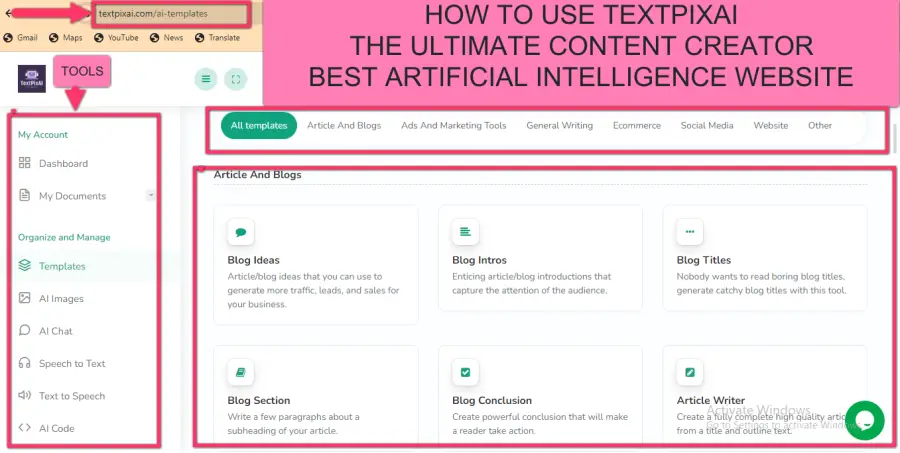AI in Business Strategy: Decision-Making and Competitiveness
Introduction
In an era defined by digital transformation and rapid technological advancements, businesses are increasingly turning to Artificial Intelligence (AI) to shape their strategies and stay competitive. AI is not merely a tool but a strategic enabler that can help organizations make data-driven decisions, enhance customer experiences, optimize operations, and gain a competitive edge. This article explores the profound impact of AI on business strategy, examining its benefits, applications, challenges, and future prospects.
You may also like to read:
AI in Human Resources: Transforming Talent Management and HR Practices
The Evolution of Business Strategy in the AI Era
Traditional vs. AI-Infused Business Strategies: A Comparative Overview
Traditionally, business strategy development involved a combination of experience, intuition, and historical data analysis. While these methods have been effective, they often lacked the speed and precision required in the fast-paced digital landscape. In contrast, AI-infused strategies leverage machine learning algorithms to analyze vast datasets, identify patterns, and generate insights at a scale and speed impossible for humans alone.
The AI era has ushered in a new paradigm of strategic thinking, where data takes center stage, and decision-making is empowered by algorithms that continuously learn and adapt.
The Impact of AI on Business Strategy Development and Execution
AI is transforming every aspect of the business strategy lifecycle:
-
Strategy Formulation: AI algorithms can process a wide range of external data sources, such as market trends, competitor activities, and customer sentiments, to provide comprehensive insights that inform strategic decisions.
-
Implementation: AI-powered tools can automate and optimize various business processes, reducing operational costs and enabling the efficient execution of strategic plans.
-
Monitoring and Adaptation: Real-time data analysis allows businesses to monitor the progress of their strategies and make rapid adjustments in response to changing market conditions.
The Need for AI-Driven Approaches to Remain Competitive in the Digital Age
In today's hypercompetitive business landscape, organizations that fail to harness the power of AI in their strategies risk falling behind. AI not only provides a competitive advantage but has become a necessity for survival in industries where disruptive innovation and rapid adaptation are the norm.
Understanding AI in Business Strategy
Defining Artificial Intelligence and Its Relevance in Business Strategy
Artificial Intelligence refers to the development of computer systems capable of performing tasks that typically require human intelligence. In the context of business strategy, AI encompasses a broad range of technologies, including machine learning, natural language processing, computer vision, and predictive analytics.
AI's relevance in business strategy lies in its capacity to analyze vast datasets, discover hidden insights, automate decision-making processes, and predict future trends. By doing so, AI augments human capabilities, offering a more comprehensive and data-driven approach to strategic planning.
The Transformative Potential of AI in Strategic Decision-Making
The integration of AI into strategic decision-making is transformative in several ways:
-
Data-Driven Insights: AI processes structured and unstructured data to uncover patterns, trends, and correlations that human analysts may overlook. This enables organizations to make decisions based on comprehensive data-driven insights.
-
Competitive Advantage: AI can identify market opportunities, competitive threats, and emerging trends more rapidly and accurately than traditional methods, providing a competitive advantage.
-
Personalization: AI enables personalized strategies for customer engagement, product offerings, and marketing campaigns, enhancing customer satisfaction and loyalty.
How AI Integrates with Traditional Strategic Frameworks
AI doesn't replace traditional strategic frameworks like SWOT analysis or Porter's Five Forces but complements them. AI provides a wealth of data that can inform and refine these frameworks, making them more precise and actionable.
For example, AI can analyze customer sentiment data to assess threats and opportunities in the market, or it can optimize supply chain operations to reduce costs, a key consideration in strategic planning.
Benefits of AI in Business Strategy
Data-Driven Insights and Competitive Advantage
One of the most significant advantages of AI in business strategy is the ability to extract valuable insights from data. AI algorithms can analyze market trends, customer behaviors, and competitive landscapes to provide organizations with a comprehensive understanding of their business environment. This data-driven approach allows businesses to make strategic decisions that are rooted in empirical evidence rather than intuition.
For instance, an e-commerce company can use AI to analyze customer purchase history and preferences, enabling personalized product recommendations and pricing strategies. This not only enhances the customer experience but also drives revenue growth and market competitiveness.
Enhanced Customer Experience and Personalization
In today's customer-centric landscape, delivering a personalized experience is paramount. AI plays a crucial role in understanding customer preferences, behaviours, and needs. By analyzing customer data, including browsing history, purchase patterns, and social media interactions, AI can tailor marketing campaigns and product recommendations to individual customers.
For instance, streaming platforms like Netflix and Spotify leverage AI to curate personalized content playlists and recommendations based on user preferences. This level of personalization fosters customer loyalty and drives engagement.
Improved Operational Efficiency and Cost Optimization
AI can optimize business operations across various functions, leading to improved efficiency and cost savings. For example:
- Supply Chain Management: AI-driven demand forecasting can optimize inventory levels, reducing carrying costs and minimizing stockouts.
- Manufacturing: AI-powered predictive maintenance can anticipate equipment failures, reducing downtime and maintenance costs.
- Customer Service: Chatbots and virtual assistants can handle routine customer inquiries, reducing the need for human intervention and lowering support costs.
By automating and optimizing these processes, organizations can allocate resources more effectively, streamline operations, and achieve cost savings that contribute to overall profitability.
AI-Powered Tools and Techniques in Business Strategy
Predictive Analytics for Market and Competitive Analysis
Predictive analytics leverages historical and real-time data to forecast future trends, enabling organizations to anticipate market shifts and competitive moves. This technique is particularly valuable in industries with dynamic market conditions.
For instance, a retail business can use predictive analytics to anticipate seasonal demand patterns, optimize inventory levels, and develop pricing strategies that maximize revenue during peak periods.
AI-Driven Customer Relationship Management (CRM)
AI-powered CRM systems analyze customer interactions and behaviors to provide valuable insights. These insights empower organizations to:
- Identify high-value customers and personalize marketing efforts to retain them.
- Predict customer churn and take proactive measures to prevent it.
- Improve customer service by providing support agents with relevant information during interactions.
Automation of Supply Chain and Inventory Management
AI can revolutionize supply chain and inventory management by automating critical processes such as demand forecasting, procurement, and logistics planning. AI-driven supply chain solutions optimize:
- Transportation routes to reduce costs and delivery times.
- Inventory levels to prevent overstocking or understocking.
- Supplier relationships by identifying reliable partners and negotiating favorable terms.
AI in Risk Management and Fraud Detection
AI-powered risk management and fraud detection systems analyze vast datasets to identify anomalies and potential risks. Financial institutions use AI to:
- Detect fraudulent transactions in real-time, minimizing financial losses.
- Assess credit risk by analyzing borrower data and predicting default probabilities.
- Monitor market conditions and geopolitical events to anticipate risks to investments.
Real-World Applications
AI in Pricing Strategies and Revenue Optimization
Pricing strategies have a direct impact on a company's profitability. AI can analyze market dynamics, competitor pricing, and historical sales data to develop dynamic pricing strategies that maximize revenue while remaining competitive.
For example, ride-sharing platforms adjust fares in real-time based on demand and supply, ensuring that prices reflect the current market conditions.
Market Segmentation and Targeted Marketing with AI
AI helps businesses segment their customer base more effectively and tailor marketing campaigns to specific segments. By analyzing customer data, AI can identify unique segments with distinct preferences and behaviors.
Retailers use AI-driven marketing automation tools to send personalized product recommendations to different customer segments, increasing the likelihood of conversion.
AI-Infused Business Models and Innovation
AI enables the creation of entirely new business models and revenue streams. For example:
- Subscription-based services, such as streaming platforms, use AI to curate content libraries and predict user preferences.
- Online marketplaces employ AI algorithms to match buyers and sellers more effectively, optimizing transactions and revenue.
Competitive Intelligence and AI-Driven Market Entry Strategies
AI can analyze competitor activities, market trends, and customer sentiment to inform competitive strategies. Organizations can use AI-driven insights to:
- Identify gaps in the market and develop innovative products or services.
- Assess the competitive landscape and formulate market entry strategies.
- Monitor competitor pricing and promotions in real-time and adjust strategies accordingly.
Challenges and Ethical Considerations
Data Privacy and Security in AI-Driven Business Strategies
As organizations collect and analyze vast amounts of data, data privacy and security become paramount. Ensuring compliance with data protection regulations, obtaining user consent, and safeguarding sensitive information are critical considerations.
Organizations must implement robust data governance frameworks to protect both customer and corporate data. This includes encryption, access controls, and regular security audits.
Bias and Fairness in AI Decision-Making
AI algorithms can inadvertently perpetuate biases present in historical data. For example, if historical hiring decisions were biased, AI models trained on that data may also exhibit bias. Addressing these biases and ensuring fairness in AI-driven decisions is an ongoing challenge.
Organizations should adopt measures such as fairness audits, bias detection algorithms, and diverse training datasets to mitigate bias in AI systems.
The Human-AI Collaboration Challenge
While AI can automate many aspects of business strategy, there remains a need for human oversight and intervention. Human judgment, ethics, and creativity are essential components of strategic decision-making that AI cannot replicate.
Balancing the automation of routine tasks with human expertise is crucial to ensure that AI-driven strategies align with organizational values and objectives.
Future Prospects and Innovations
The Role of AI in Shaping Sustainable Business Practices
Sustainability is an increasingly important aspect of business strategy. AI can analyze environmental data, supply chain information, and consumer preferences to help organizations develop more sustainable practices.
For instance, AI can optimize transportation routes to reduce carbon emissions or recommend eco-friendly product alternatives to consumers.
AI-Driven Scenario Planning and Adaptive Strategies
AI's ability to process vast amounts of data in real-time makes it well-suited for scenario planning. Organizations can use AI to model various scenarios, such as market disruptions or economic shifts, and develop adaptive strategies that respond to changing conditions.
For example, retailers can use AI to adjust inventory levels and pricing strategies during unexpected events like natural disasters or pandemics.
The Integration of AI with Emerging Technologies (e.g., IoT, Blockchain)
AI's synergy with emerging technologies opens up new avenues for innovation in business strategy. Combining AI with the Internet of Things (IoT) allows organizations to collect real-time data from connected devices, enabling more informed decision-making.
Blockchain technology, coupled with AI, can enhance transparency and trust in supply chains, enabling organizations to make strategic decisions based on secure and tamper-proof data.
Conclusion
AI has evolved from a buzzword to a fundamental driver of modern business strategy. Its ability to harness data, provide insights, optimize operations, and enhance decision-making makes it an indispensable tool for organizations across industries. The transformative impact of AI on business strategy is undeniable, but it comes with ethical responsibilities, particularly regarding data privacy, bias, and the need for human oversight.
As organizations navigate the AI era, they must strike a balance between automation and human judgment, ensuring that AI-driven strategies align with their values and long-term objectives. With AI's continued evolution, the future promises even more innovation in strategic planning, allowing organizations to stay agile and competitive in an ever-changing business landscape.
References
- Harvard Business Review - How AI Is Changing Strategy
- McKinsey & Company - Notes from the AI frontier: Tackling bias in AI and in business
- Forbes - How Artificial Intelligence Is Revolutionizing Business In 2019
- Deloitte - Artificial Intelligence in Business Strategy
- MIT Sloan Management Review - Reshaping Business with Artificial Intelligence







